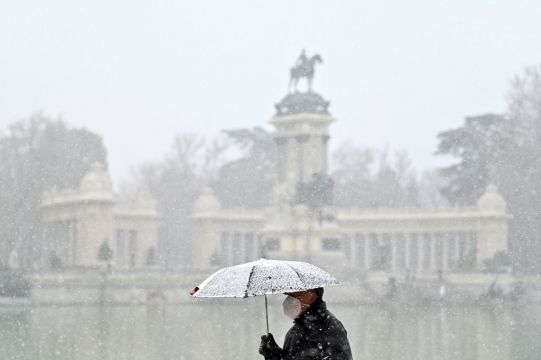Spain's capital Madrid and much of the neighbouring region of Castilla-La Mancha are on high alert for what meteorologists expect to be the heaviest snowfall in decades, brought by storm Filomena.
Such events are rare in the region and tend to be disruptive to daily life and mobility, coming at a time when people are returning home after Christmas and New Year holidays. This year, however, there is less traffic than usual due to restrictions to curb the coronavirus pandemic.
As heavy snow started falling on Friday, authorities said large parks in Madrid, including the famous Retiro next to the Prado museum, would be closed from Friday afternoon as a precaution.
With up to 20cm of snow forecast in 24 hours and temperatures expected to hover around zero centigrade for much of the day, the south of the Madrid region, including the capital, is on its highest level of alert for the first time since the system was created in 2007.
Ruben del Campo, a spokesman for the State Meteorological Agency, said the city was probably facing the heaviest snowfall at least so far in the 21st century.
“Perhaps we would have to go back to the snowfall of February 1984 or to that of March 1971 to find similar precedents if the forecasts we are expecting are correct,” he added.
Lowest ever temperature
Light snow already blanketed Madrid on Thursday, a day after Spain registered the lowest temperature ever recorded on the Iberian peninsula, of -34.1C, in the Pyrenees in the north.
Storm Filomena is advancing through Spain after hitting the Canary Islands with strong winds and rain.
In Gran Canaria, a ferry with 59 passengers and 17 crew ran aground on Thursday night due to the strong winds when entering the port of Agaete.
On Friday the coastguard were towing the ferry to the port, with passengers and crew still onboard, unhurt.







